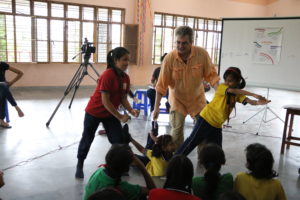Know Understanding
Sept.15
Often, a concern that rises as I begin work is translation: Will I need it or not? Humorously, just before I started the work of my current fellowship, one person asked, “You understand Hindi, yes?” Extremely humorous. I didn’t laugh, as the question was a serious one. I simply offered the one word I know. So, a question about understanding followed and we decided that we would see what was necessary, as a couple of the National School of Drama (NSD) students admittedly have limited English. (Of course, as I quickly noted, nowhere near the limits of my Hindi!).
Language most certainly needs to be taken into consideration and a few times in my multiple experiences I did need a translator (or two or more, on at least one occasion!). However, the question about ‘understanding’ is an interesting one to me. I don’t believe difference in language is, at core, about lack of understanding. I think it is more about not knowing. If two of us speak different languages, we may not specially know what each other is saying. We still might understand bits of the conversation. Lack of understanding could happen regardless of language similarity. In other words, even if you know what is being said, you still might not understand.
As I started my teaching here at NSD, I had two different groups. In each, there were people of several different home languages, though most (except me!) knew/know Hindi. Amongst them, there were a small contingent that had a hard time following my speaking. There were several who had never worked with an American, so my accent was one big issue. Speed of speaking was another obstacle. Limited English vocabulary as well. So, we had to stop regularly to check for hearing and knowing all of the words. As we worked, two things happened. In our shared desire to move past the language obstacle, I changed my speaking patterns to match the needs. At the same time, most of the ‘low’ English students committed to exercising their English. One particularly refused to accept translation and said he wanted to conquer a needless hurdle. What slowly happened, which I loved experiencing, was how the basic determination helped us move past the hurdle. It wasn’t about UNDERSTANDING; it was simply learning to deal with language different.
 And, of course, we’ve been working in drama, so that helped significantly, because we played with creative ways to move past even language to find commonality in understanding.
And, of course, we’ve been working in drama, so that helped significantly, because we played with creative ways to move past even language to find commonality in understanding.
Interestingly, and part of the reason I have thought about the difference between understanding and knowing, is that I have had a couple of students in different situations here that even as they seemed to or admitted to knowing, demonstrated lack of understanding. We actually had to use more language to reach that understanding.
When I visited a class of children at a school, the NSD students came along with me. At first, several of them helped with translation because there seemed to be both low knowing and understanding. So, as best I could in that short time, I adjusted and played with language and creative alternatives to discover what might work. About halfway through, I stopped the translation. Although some students still seemed to struggle, they started to solve the barrier thought observation of fellow students and occasionally reaching out to neighbors for clarity.
This language and understanding journey have allowed us all to find some humor in the situation and get a little playful about language differences and understanding challenges. We have accepted it as a part of the journey and let ourselves enjoy the process.
One side note, which has been fun to watch evolve, is that I occasionally share stories or written materials. The students have to work together to help each other in some instances, but in other instances they pull out their phones and do online translations to help them read in their own language. This helps the KNOWING. But I firmly believe it is our interactions that truly support UNDERSTANDING. And speaking and expressing ourselves in multiple ways actually helps deepen our common understanding while bringing us closer together in the endeavor.
